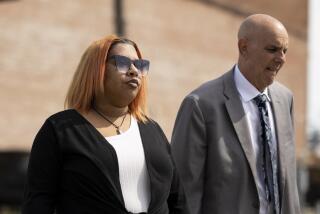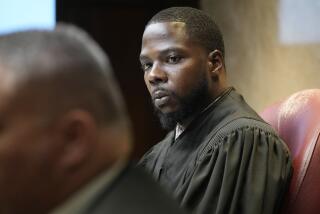Boy placed in state facility for killing neo-Nazi father
- Share via
A judge ruled Thursday that the Riverside County boy who killed his neo-Nazi father should be placed in a state-run juvenile justice center for a maximum of 10 years, rejecting an argument by the boy’s lawyers that the facilities would be unable to meet his special needs.
The boy, 13, had been found guilty of second-degree murder and using a gun while committing a felony — crimes that carried a sentence of 40 years to life in prison. But because he was charged as a juvenile, prosecutors said, he can be held in custody only until he is 23, and the judge mandated that a parole hearing be held after seven years, when he is 20.
The sandy-haired boy with black glasses, who fidgeted through much of the proceedings, sat calmly as Judge Jean P. Leonard read her decision to a packed courtroom. His grandmother, the victim’s mother, similarly displayed little emotion at the close in the latest chapter of a process she had called “our walk through hell.”
As part of the ruling, the boy will also be banned from possessing a firearm until he is 30.
Punam Grewal, the boy’s lawyer, blasted the decision as a “miscarriage of justice.” She had advocated sending the boy to a private, residential facility that would be secure but also, she believed, better suited to handle his social and emotional disabilities and other issues, including vision and speech problems.
As much as she disagreed with it, she said the ruling didn’t come as a surprise. The options she had supported, she said, had been thwarted when he was found guilty of second-degree murder.
“She got it wrong, we knew she would get it wrong,” Grewal said of the judge’s decision outside the courthouse Thursday.
“We presented overwhelming evidence that this particular correctional facility is not a fit for this particular child,” Grewal said, “due to his disabilities, due to his individual life circumstances and the fact that he’s going to be the youngest child surrounded by gang members and older kids who have committed sexual offenses.”
She said the boy’s legal team was planning to appeal.
“The complaint was overcharged,” she said. “There was a complete disregard of the evidence of this child’s disabilities, complete disregard of the evidence of the horrific 10 years of abuse that he suffered.”
On the morning of May 1, 2011, when the boy was 10, he shot his father point-blank in the head as he slept on a couch in the living room.
His father, Jeffrey Hall, was a West Coast leader of the neo-Nazi organization known as the National Socialist Movement. During the trial, an attorney for the boy said that Hall had routinely beaten him. Shortly before Hall was killed, he threatened to leave the family and to set the house on fire with his children and wife inside.
The judge previously ruled that the boy possessed the mental capacity to know that killing his father was wrong. The Times is withholding the boy’s identity because of his age.
But prosecutors said that killing his father wasn’t an isolated act of violence. Instead, they argued that he was predisposed to aggression, a “hallmark of his early life,” as Chief Deputy Dist. Atty. Michael Soccio described it in his closing arguments.
He had attacked teachers, including attempting to strangle one with a telephone cord. Even when he was a toddler, his grandmother refused to baby-sit him because of his behavior.
Soccio said that, over time, he has grown fond of the boy, even asking in court Thursday that the judge permit him to make contact with him in the juvenile facility. He described the boy in his closing arguments as a “survivor.”
“He’s resilient,” Soccio said. “He’s a thriver under the worst conditions.”
But he said that the boy was dangerous and a “lost soul.” Soccio said the boy “was born with a very troubled spirit, with a lot of anger.”
Soccio said he was hopeful that the boy would receive the support and treatment needed to be ready to reenter the world as an adult.
“My hope is that he can face up to what he did and be able to handle that,” he said, “and be able to come out as undamaged as possible.”
More to Read
Sign up for Essential California
The most important California stories and recommendations in your inbox every morning.
You may occasionally receive promotional content from the Los Angeles Times.













